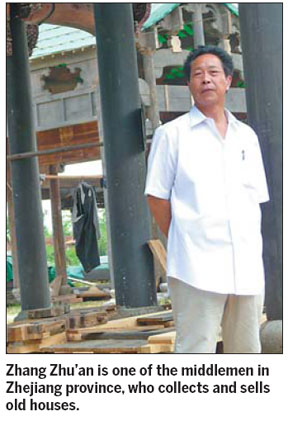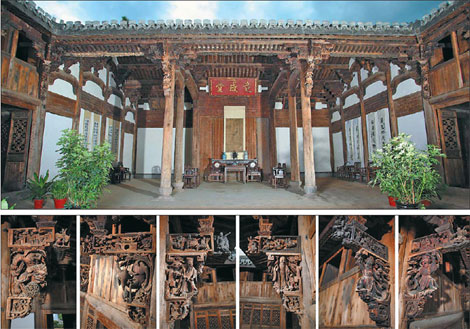Heritage
Show homes
Updated: 2011-07-28 08:02
By Xu Junqian (China Daily)
|
Top: Jingcheng Hall is one of the old houses collected by Yang Handong, a textile tycoon in Yiwu. It has been turned into a free public park. Above: Elaborate wood carvings can be found in Jingcheng Hall. Photos Provided to China Daily |
Old houses in the Yangtze River Delta's countryside are being dismantled and reassembled for display in the gardens of the nation's new rich. Xu Junqian reports.
At a hidden warehouse, on a vast expanse of open moorland in Dongyang, Zhejiang province, a group of middle-aged carpenters are busy working on a pile of pillars and corbels, beams and windows. Spread over the 10,000-square-meter clandestine locale that has no name or address - marked only by a muddy path - they have been carefully dismantled from century-old houses scattered throughout the Yangtze River Delta countryside.
Once reassembled, they will move into the gardens of the country's nouveau riche.
Tired of filling their working and living rooms with antique vases, ink paintings, calligraphy and 19th-century hardwood furniture, the emerging upper class is looking for something new to show off their wealth and cultural sensitivities.
And buying these quaint houses that date back to as early as the Ming (1368-1644) or Qing (1644-1911) dynasties, is becoming a popular choice.
The trend has been growing in the recent years, Zhang Zhu'an, co-owner of the nameless warehouse site, says. "More people, including the not-so-affluent, are seeing them as an investment."

These ancient houses can range from 300 to 400 square meters, with some even reaching 1,000 square meters. While they rival the size of the buyers' homes, these collectors' items are mostly for display.
Zhang, a 61-year-old Dongyang native, and his partner, the main investor of the warehouse, started the business three years ago. Although the carpenter-turned-businessman sidesteps questions about how lucrative the business is, he acknowledges it has been "acceptable" from the beginning. Now, they sell one house every two or three months.
The older the house, the pricier it gets, Zhang says. "But the style of the house, its condition or the status of its former owner - say he is a famous political figure - can also add to the value."
With a team of about 10 carpenters, who double as porters, Zhang's warehouse is the biggest of its kind in Zhejiang and possibly in the country.
Over the past few years, more than 10 houses have been relocated from remote villages to be reassembled and refurbished in the warehouse and then dispatched to the properties of affluent buyers in Hangzhou, Shanghai and even as far away as Beijing.
Currently, there are nine houses here, some of which are ready to be "taken away". Most are typical southern Chinese residences, featuring upturned eaves, elaborate woodcarvings and thick and straight pillars.
"This one is not that ancient. It dates from the end of the Qing Dynasty," says a 49-year-old carpenter, surnamed Pan, referring to a door from a typical Anhui-style house, currently the most popular variety on the market, that he has been working on for five weeks.
"I heard the whole house was bought for several hundred thousands yuan. But this door alone can be sold for more than 10 million yuan ($1.55 million) after I'm done with polishing it," Pan says.
There are about five or six similar warehouses in Dongyang, a city best known for its ancient craft of woodcarving, Zhang says. Just a few meters from his site is a similar, but much smaller, warehouse with four dismantled houses.
"People may think it is easy to start a business like this because of a huge supply of carpenters here," Zhang says. "But good houses are becoming increasingly hard to find, as they have either been taken apart by collectors or demolished by their owners to make way for new modern buildings."
Zhang says that while his special "hunting crew" travels the country looking for houses, he also networks with furniture recyclers and secondhand storeowners in the area.
"If they come to know of someone who wants to sell his house, they will immediately call me," Zhang says, adding that he only goes for structures that are at least 70 percent intact.
"For the province's growing number of rich people, such houses represent the ultimate collectors' item," says Yu Feng, vice-chairman of Collection Association Club of Yiwu, the city neighboring Dongyang.
"After all, the vases, paintings and precious chairs need a place where they can be put. And what better choice than a heritage house," Yu says.
The club, founded in 2005, has about 300 members in Yiwu. As the world's largest small commodity center, it attracts hordes of the parvenus.
Every year, they host exhibitions to showcase their art collections. An antiques market that can accommodate 500 stalls also opened earlier this year.
"I can't say how many people are doing this (collecting houses), as we don't have such figures in the club," says Yu, whose own collection includes five houses.
They occupy a 2,000-square-meter space that the logistics tycoon has specially rented.
According to some industry insiders, a Yiwu businessman has 100 such homes from all over the country in his collection.
"If you start early enough, you can get a house for no more than 50,000 yuan," Yu says.
But with more people entering the market, the average price has easily doubled.
The profit for middlemen like Zhang has dropped from 50 to about 30 percent of the price.
For Yu and others like him, the biggest headache remains finding a place for their house collections. "After all, it's not that easy to buy land. And once you move a house, it's not likely you can do so again," Yu says.
But even as some worry about where to put their gigantic collections, others have found ways to make money out of them.
Zhu Youfu, a retired local official in Yiwu's Fotang village has turned his collection - worth millions of yuan - into a tourist attraction in his hometown.
With a nearly 1,000-square-meter house built at the beginning of the 1800s and several other smaller ones, the site has become a recreational complex that also offers dining, accommodation and sightseeing.
Yang Handong, meanwhile, is more generous with sharing his collection.
Yang is the owner of Hujiang Group, the country's biggest thread producer, which is also based in Yiwu.
Apart from an underground museum that is home to 300 old vases and paintings located below the teahouse he runs, the antiques aficionado has also built a park behind his factory for his seven heritage houses. Admission is free to the public.
The purchase of old houses can be controversial.
Chen Rongjun, director of Dongyang Relic Protection Office, says that although it is legitimate to buy these houses not categorized as "relics under protection", the houses, which are one of the few legacies of the local culture, become "dead" once they leave their original locations.
According to the local government, only 207 homes in the area are categorized as "relics under protection", leaving 1,560 houses labeled as just "relics", for not meeting one or another of the protection category standards.
"Homes with historical value are disappearing fast. More villagers are willing to exchange their homes for money to build new villas, and we are not there to stop them," Chen says.
But Zhang, the middleman, is defensive. "We are far more professional than the owners while dealing with these houses, which are usually in a seriously dilapidated state when they come to us," he says.
"It's true we are making money from them but not by tearing them down," he adds. "Rather, we are restoring them to their former glory, which is definitely better than letting them suffer further wear and tear."

Specials

Turning up the heat
Traditional Chinese medicine using moxa, or mugwort herb, is once again becoming fashionable

Ciao, Yao
Yao Ming announced his retirement from basketball, staging an emotional end to a glorious career.

Financial sector short of talent
Lack of skilled professionals in Shanghai inhibiting the city's development as a financial hub
